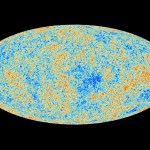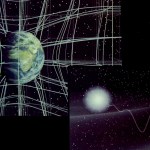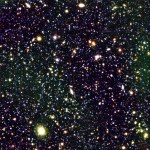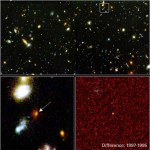Cosmological Constant
“Because dark energy makes up about 70 percent of the content of the universe, it dominates over the matter content. That means dark energy will govern expansion and, ultimately, determine the fate of the universe.” -Eric Linder
It's been a while since we've spoken about dark energy, and we were just talking about Einstein's greatest blunder, so let's just dive right in.
Image credit: S. Beckwith & the HUDF Working Group (STScI), HST, ESA, NASA.
This is our observable Universe, as unveiled by the Hubble Space Telescope. With hundreds of billions of galaxies stretched out some 41…
"Anyone who has never made a mistake has never tried anything new." -Albert Einstein
Back when Einstein first proposed his theory of General Relativity, his revolutionary picture of the Universe was met with a mix of curiosity, awe, and intense skepticism. It isn't every day that your most cherished of all physical theories -- the theory of Newtonian Gravity that had ruled the cosmos for nearly two-and-a-half centuries -- gets challenged by a newcomer.
Image credit: Brooks/Cole - Thomson publishing, 2005.
And yet, that's exactly what Einstein did when he proposed General Relativity at the…
"The mind, once expanded to the dimensions of larger ideas, never returns to its original size." -Oliver Wendell Holmes
When General Relativity supplanted Newton's work as our theory of how gravity works in the Universe, it didn't just change how we view how masses attract, it gave us a new understanding of what the questions where and when actually mean. It gave us the very fabric of spacetime.
Image credit: Christopher Vitale of http://networkologies.wordpress.com/.
What this meant is that no longer could we view objects like matter and radiation as existing in some fixed, grid…
"Nothing exists except atoms and empty space; everything else is just opinion." -Democritus of Abdera
When you take a look out at the Universe, past the objects in our own solar system, beyond the stars, dust and nebulae within our own galaxy, and out into the void of intergalactic space, what is it that you see?
Image credit: BRI composite-image of the FORS Deep Field, ESO, VLT.
What we normally think of as the entire Universe, consisting of hundreds of billions of galaxies, with about 8,700 identified in the tiny patch of deep-sky shown above. Each one of those galaxies, itself…
Recipients of the 2011 Nobel Prizes were announced the week of October 3. The winners in medicine were honored for their work in immunology, as reported on Tomorrow's Table. Steinman "discovered a new class of cell, known as dendritic cells, which are key activators of the adaptive immune system;" shockingly, he died a few days before the announcement. On We Beasties, Kevin Bonham questions the significance of Beutler's contribution, saying "the conceptual groundwork for its importance in the immune response had already been laid" by a researcher named Janeway. Kevin continues, "giving…
Sure, there's dark energy, but what does that really mean? First off, there's the bizarre phenomenon we see: very distant objects appear dimmer than we expect in a Universe filled with just matter and space. This supernova (above) should appear much brighter for how distant it is, based on what we know about supernova. This means one of three things are going on:
Supernova were intrinsically different when they were younger, and inherently fainter.
Some type of dust is blocking the light from distant supernova, making them seem fainter.
These supernova are actually farther away than we had…




